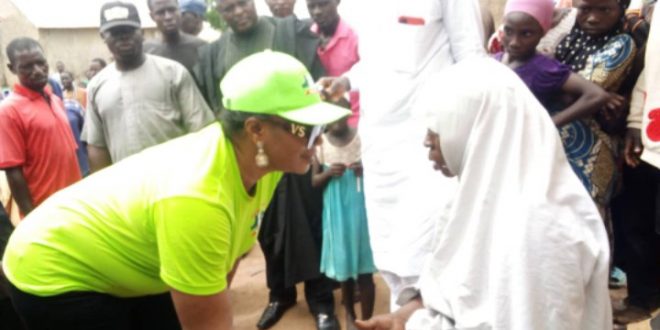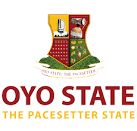Nasarawa State Government says it has concluded arrangement to commence the second phase of distribution of palliatives to indigents and vulnerable persons and 1,000 each from the local government areas in the state.
Already, the state government, through the Ministry of Special Duties on Humanitarian, Social Services and NGOs, has began issuing cards to prospective beneficiaries of the palliatives to be distributed on a later date, commencing with Awe Local Government
Princess Margaret Itake Elayo, the Commissioner for Special Duties on Humanitarian, Social Services and NGOs, who led a team from her Ministry to the stakeholders meeting at the Palace of Sarki Awe,disclosed this where she briefed them on the process and the category of persons to be issued with the cards.
Thereafter, the Commissioner further led an entourage, including the Council Chairman, Usman Umar among others, on a symbolic presentation of the cards to about eight indigents at the Madaki ward (the old Awe town) in Awe local government.
The capturing and collation of data of the aged, was a sample of what the stakeholders are expected to do at their various wards.
The essence is to have the social register intact so that, during the exercise the right people that are deserving will benefit.
During the distribution of the palliatives, which will soon commenced, the state government planned to feed 1000 children, alongside the distribution in each of the local government areas of the state.
The Humanitarian Commissioner, then paid a visit to the chairman, Usman Umar in his office, where she emphasized the need for the stakeholders to strictly adhere to the process of sharing to avoid diversion of the palliatives.
Princess Elayo appealed to the stakeholders to ensure that every citizens of the state captured for the exercise is benefited.
“We are about to start the second phase of the distribution of rice and other incentives, and we felt it necessary to have the right people that will benefit from the distribution.
“The first phase are not to be repeated. The second phase, we are to capture new people, the real vulnerable people, not people that can go out there and work and fend for themselves.
“We want to take care of our aged parents, we want to take care of people we know in our communities cannot afford a day meal,
“It’s going to be 500 of the most vulnerable, 500 of the aged people and citizens who have served our communities for many years. So, is about time we start taking care of our parents and our elderly people.
“It is very important now that we get our social register data on point, because, as you aware, the Federal Government through the Minister of Humanitarian, Dr. Beta Edu, has started the process in making sure that we capture everybody that is vulnerable, especially the aged.
“The essence of gathering the stakeholders is that, we really want to know those people who are deserving to benefit from the palliatives on our next visit, that is why we are here for the mapping out,” Princess Elayo said.
“The federal government is working tirelessly to make sure it cushion the effect of the fuel subsidy is softened, so that our ages parents and vulnerable will have a better environment to leave.”
She expressed the commitment of the state government to continue to work for the interest of all in the next four years.
Princess Elayo stressed that, what the government was doing is for the benefits of the people saying that, “when we messed up with our communities, is not on the government, because the information is out properly.
“If we decide not to do it, Engr. A. A. Sule has nothing to do with what we are not doing right. He has lay the foundation, he has given us the instructions to do what the people will benefit.”
She called on the stakeholders to adhere strictly to the instructions in order to meet the targeted persons with the palliatives.
The Commissioner warned the stakeholders entrusted with the cards not to bring their friends, family members and allies as beneficiaries, stating that, anyone caught will be denied of the palliatives and punish.
“We have the ICPC, EFCC, and other law enforcement agencies, they will be there during the distribution. If I see anybody that is capable of walking, we will remove that person. You will not leave with the bag of rice.
“If I take a bag of rice home, I just denied somebody who cannot feed for a whole month.”
She said that, the palliatives”is about APC, PDP but about all Nasarawa citizens to benefit from the federal government and the state palliatives” that will start soon.
He said, the distribution will not be done by proxy, as those unable to come around will have theirs delivered to them.
Usman Umar, the Chairman of Awe Local Government said, the commencement of the second phase distribution of palliatives attest to the fact that, Governor Sule is committed to meeting the needs of the people.
The Council boss said that, stakeholders in all the 10 wards in Awe local government will select one hundred vulnerable persons from each of the wards as beneficiaries.
Umar insisted that, the categories of beneficiaries must strictly be aged and vulnerables, who are in dare needs of the gestures, and not abled persons.
He also cautioned the stakeholders not to enlist their relations, political allies or friends, who are capable of meetings their own needs, saying government would not tolerates such sentiments.
He urged them to be fair, just and transparent in the process of issuing the cards and distributing the palliatives to avoid complaints and grudges from members of the public.
The Chairman advised the stakeholders not enlist people on political party sentiment, saying the palliatives is for all, irrespective of ones political party.
The Chairman of the People’s Democratic Party (PDP), Aliyu Abdullahi Awe commended Governor Abdullahi Sule for considering members of the party in the distribution exercise, urged him to sustain the magnanimity for the good of all.
Awe called for transparency in the process of issuing cards to the beneficiaries, so as not to frustrate government effort to reach out to the people in need.
Some of those at the stakeholders meeting are: the Commissioner of Agriculture, Dan’akano, the Emir of Awe, Alhaji Isa Abubakar Umar II, the Emir of Azara, the Emir of Ribi, the Permanent Secretary, political affairs, office of the SSG, former Commissioners and Council Chairmen, IPAC representative, CAN and JNI leaders, political parties officials and other stakeholders connected with the programme.

 Hottestgistnaija.com
Hottestgistnaija.com



